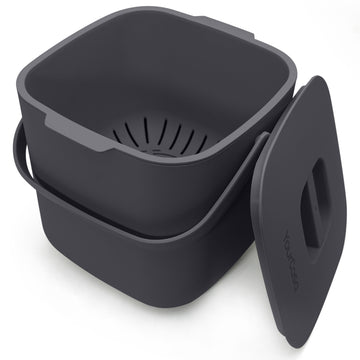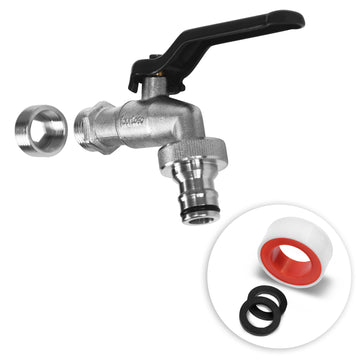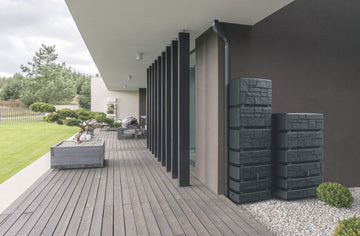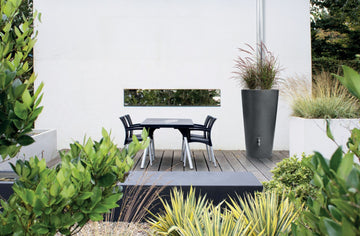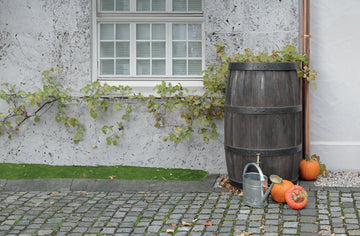
A rain barrel is so much more than just a practical accessory for your garden - you may not know that yet. Rain barrels are investments for a better future. By purchasing a barrel, you are investing your money in environmental protection, in the health of your garden plants and in protecting your wallet in the long term. Especially in times of increasing environmental awareness and rising water prices, rainwater use is becoming more and more relevant.
Why is a rain barrel worthwhile in the garden? A rain barrel in the garden is worthwhile for several reasons. Firstly, it saves money by providing free rainwater for irrigation. Secondly, it protects the environment as less drinking water is used. Thirdly, it protects plants by providing softer, natural water. Fourthly, it helps prevent flooding by collecting rainwater. Finally, a rain barrel is easy to install and maintain, making it a practical and sustainable solution for any garden lover.
In this article we will introduce you to the advantages of using rainwater in your own garden. We are sure that we can convince you too.
How does a rain barrel help you save money?
A rain barrel helps you save money by providing free rainwater for irrigation and other household purposes. Instead of using expensive tap water, you can use the collected rainwater for your garden, cleaning garden furniture or washing your car.
Let's say you water your garden twice a week during the warmer months with about 100 litres of water. With a rain barrel, you can then save an average of 800 litres of water per month - assuming it rains enough. At an average price of €2 per cubic metre of tap water, that means a monthly saving of around €1.60. Over the course of the year , that adds up to over € 19.20 - and we're just talking about watering the garden. These savings can be even higher if you also use the rainwater for other tasks, such as flushing the toilet or doing the laundry.

Why is rainwater better for your plants?
Rainwater is better for your plants than tap water for several reasons .
First, it is free of chlorine and other chemicals that are often found in tap water. These chemicals can hinder the growth of your plants and negatively affect soil health. Rainwater, on the other hand, is soft and contains natural nutrients that promote plant growth.
Second, rainwater helps balance the pH of the soil , which is especially important for plants that are sensitive to pH. Using rainwater makes the soil less alkaline and promotes the uptake of nutrients by plant roots, resulting in more vigorous growth and healthier plants.
To ensure that you don't waste a drop of your rainwater, you should apply it directly to the roots of your plants . This will minimize evaporation and ensure that the water penetrates deep into the soil. It is best to water in the early morning or late evening when temperatures are lower and less water evaporates. Also, avoid wetting the leaves of your plants to reduce the risk of fungal diseases.
How does a rain barrel contribute to environmental protection?
Rain barrels are also real all-rounders when it comes to environmental protection. A rain barrel makes a significant contribution to environmental protection by reducing your water consumption and CO₂ emissions - as follows:
- By using rainwater instead of tap water , the need for expensively treated drinking water is reduced . Water treatment and distribution require considerable amounts of energy, which mostly comes from fossil fuels. By using rainwater, you reduce this energy consumption and thus CO₂ emissions.
- Rainwater also benefits local ecosystems because it is softer and free of chemical additives such as chlorine. This is not only gentler on your plants, but also on the soil, which can be damaged by constant exposure to chemically treated water. Soft water promotes soil structure and nutrient absorption, contributing to a healthier ecosystem in your garden.
Saving rainwater is more important today than ever before. Dry periods are becoming more frequent in Germany . Fluctuations in precipitation patterns can also cause flooding, which can have catastrophic consequences. By using rainwater, you can reduce the CO₂ emissions that can result from such effects.
What practical advantages does a rain barrel offer?
In general, all rain barrels offer benefits for you, your garden and the environment - starting with easy installation and maintenance . Rainwater collection systems are easy to install and usually only require basic tools. Once installed, they are almost maintenance-free - but you should clean them at least every six months.
Modern rain barrels have overflow protection and filter systems that keep out contaminants and ensure that excess water flows away in a controlled manner. This helps to use water resources efficiently and prevents valuable rainwater from being lost unused.
In contrast to the products of other manufacturers, YourCasa products are not only functional , but also look good. They are made from particularly high-quality materials. This means they can withstand the elements and retain their attractive appearance for many years. A rain barrel from YourCasa fits harmoniously into any garden and visually enhances it.
Practical advantages:
- Easy installation
- Low maintenance
- Efficient use of water resources through overflow protection and filter systems
- Durability and weather resistance
- Aesthetically pleasing design
What financial advantages does a rain barrel offer in the long term?
If you are thinking about buying a rain barrel, you may be put off by the price of some models. But we can reassure you: in the long run, investing in a good rain barrel is always worth it . It will reduce your water bill considerably.
The initial investment costs for a high-quality rain barrel from YourCasa are quickly paid off through the savings on your water bill. Rainwater is free and can be used in many ways, such as watering the garden, cleaning garden furniture or washing the car.
By using rainwater for the garden and household, an average four-person household can save up to 40 cubic metres of water per year . Let's assume your annual water bill is €300. A cubic metre of water costs around €3.80 including wastewater charges. With a rain barrel, you can potentially save €152 per year. Within a few years, you will have completely saved the cost of the rain barrel and will continue to benefit from the reduced water costs.
Investing in high-quality products pays off in the long term. This is also the case with YourCasa. YourCasa offers rain barrels that are durable and weatherproof , meaning you benefit from a long service life. This means less maintenance and replacement costs over the years. In addition, the robust materials and the well-thought-out design ensure that the rain barrel remains functional and attractive even after many years.
Examples of popular rain barrels from YourCasa are the following:
| Model | liter | Features | Price (€) |
| Seabreeze Flower | 240 liters | Integrated planter; frost-resistant plastic | 109.99 |
| Wave Design | 240 liters | Frost-proof; UV-resistant | 109.99 |
| Amphora Design | 210/360/440 litres | Frost-proof; with tap | from 95,99 |
| Tower | 120 liters | Space-saving; modern design | 79.99 |
| StoneRain | 300 litres | Frost-proof; UV-resistant | 324.99 |
| Eco Tower | 260/720 litres | Slim; with metal thread | from 219,99 |
| Premium | 290 liters | Frost-proof; with metal thread; with lid | 179.99 |
| Dual style | 200 litres | Robust plastic; two designs to choose from | 239.99 |
You can also buy useful accessories for your rain barrel from YourCasa. For example, you can connect a water tap to the versions with a metal thread. YourCasa also offers rain collectors for efficient water use.

Conclusion: Why should you buy a rain barrel today?
If you are still not convinced about buying a rain barrel for your garden, you should take another look at the advantages in the overview :
- Save money by using free rainwater
- Better plant growth thanks to chemical-free water
- Contribution to environmental protection by reducing water consumption and CO₂ emissions
- Easy installation and low maintenance
- Efficient water use through overflow protection and filter systems
- Long-term savings and product durability

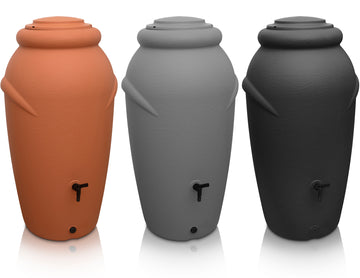
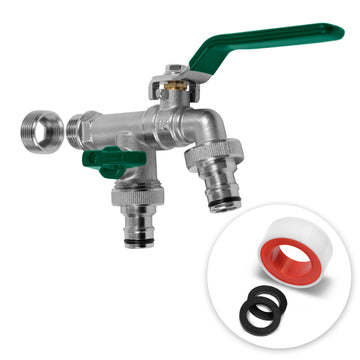
![Drei hohe YourCasa Regentonne 240 Liter [Wellen-Design] - Frostsicher & UV-beständige Gartentöpfe in den Farben Schwarz, Grau und Terrakotta, jeweils mit Drainagesystem für nachhaltige Bewässerung.](http://yourcasa.de/cdn/shop/files/ohnelogo_b8aeecac-557e-4106-a999-e77dcd160209.jpg?v=1707130230&width=360)
